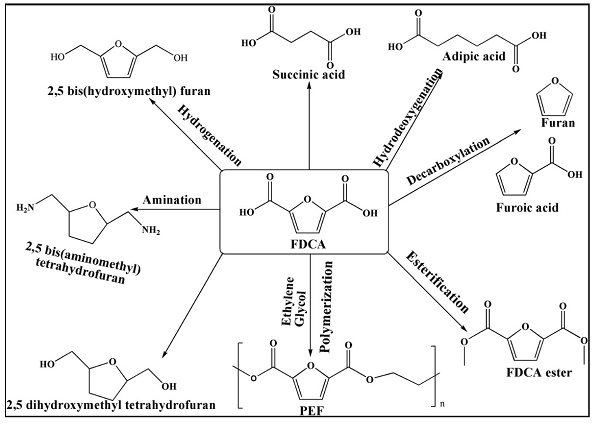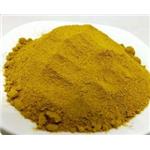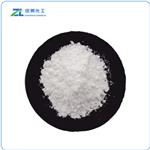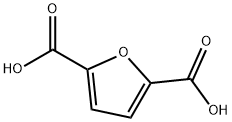A alternative to fossil fuels: 2,5-Furandicarboxylic acid
Jan 5,2024
Description
Disproportionate fossil fuel extraction has caused severe environmental damage and adverse impacts. Therefore, people have been trying to find alternatives to fossil fuels. The US Department of Energy (DOE) has identified the top 12 value-added chemicals that can be considered as a replacement for several fossil fuel-derived chemicals and fuels. One such molecule is 2,5 furan dicarboxylic acid (FDCA), which is listed among the top 12 chemicals and can produce biopolymers.
Synthetic method
FDCA is a relatively novel chemical made from fructose using a multistep catalysis process involving dehydration and oxidation steps[1]. Biocatalytic processes for FDCA production from HMF using enzymes or microorganisms, in general, are preferred due to their requirement of ambient temperature and atmospheric pressure. Moreover, intermediates and byproducts produced via biocatalytic processes are mostly non-toxic and biodegradable, which makes the overall process green. On the contrary, the biocatalytic method faces significant challenges in lower FDCA yield and complex purification requirements. In general, biocatalytic processes for FDCA production can be broadly categorized into two major classes: enzymatic and whole-cell.
Uses

FDCA is a biobased organic molecule of two carboxylic acid groups bonded to a central furan ring. It has a higher melting point of 342 ℃, which makes it thermally stable and suitable for polymeric applications. Indeed, FDCA can replace petroleum-based terephthalic acid to produce biobased plastic polyethylene furan dicarboxylate (PEF) due to the similarity in its functional group with terephthalic acid[2]. Importantly, biobased plastic PEF produced using FDCA is biodegradable; thus, it can be used commercially. Indeed, several companies such as Coca-Cola, Avantium, Danone, and ALPLA plan to produce FDCA-derived PEF plastic bottles on a commercial scale.
Moreover, FDCA and derived molecules have applications in packaging, clothing, disposable items, polyamide, polyurethanes, thermosetting, resins, polyesters, plasticizers, fungicides, macrocyclic ligands, dipentyl furan- 2,5 carboxylate,thiolenefilms, and several daily life applications. Furthermore, FDCA can be used as a feedstock to produce a wide range of chemicals and intermediates such as succinic acid, adipic acid, furan, 2,5 bis(hydroxymethyl)furan, FDCA ester, 2,5 bis(aminomethyl) tetrahydrofuran.
References
[1] Meraldo, Antonio. “Introduction to Bio-Based Polymers.”Multilayer Flexible Packaging (Second Edition) 2016: 47-52.
[2] Shivshankar Prasad . “Recent advances in the production of 2,5-furandicarboxylic acid from biorenewable resources.” Materials Science for Energy Technologies 6 (2023): Pages 502-521.
- Related articles
- Related Qustion
- The application of 2,5-Furandicarboxylic acid Feb 2, 2024
2,5-Furandicarboxylic acid (FDCA), dehydromucic acid, is a furan derivative. FDCA is one of the top-12 value-added chemicals derived from biomass that may serve as a 'green' substitute for terephthalic acid (TPA) in polyesters.
Olmesartan medoxomil is an orally administered angiotensin II receptor antagonist, selective for the angiotensin II type 1 receptor, which has established antihypertensive efficacy in adults.....
Jan 5,2024DrugsEmpagliflozin is a selective sodium-glucose cotransporter 2 (SGLT2) inhibitor used to lower blood sugar in adults with type 2 diabetes. Empagliflozin also exerts cardioprotective effects independent from glucose control.....
Jan 5,2024Drugs2,5-Furandicarboxylic acid
3238-40-2You may like
2,5-Furandicarboxylic acid manufacturers
- 2,5-Furandicarboxylic acid
-

- $100.00 / 50kg
- 2024-11-16
- CAS:3238-40-2
- Min. Order: 1kg
- Purity: 99%
- Supply Ability: 5000Ton
- 2,5-Furandicarboxylic acid
-

- $120.00 / 1kg
- 2024-11-15
- CAS:3238-40-2
- Min. Order: 1kg
- Purity: 99%
- Supply Ability: 20ton
- 2,5-Furandicarboxylic acid
-

- $60.00 / 1kg
- 2024-11-15
- CAS:3238-40-2
- Min. Order: 1kg
- Purity: 99
- Supply Ability: 5000






